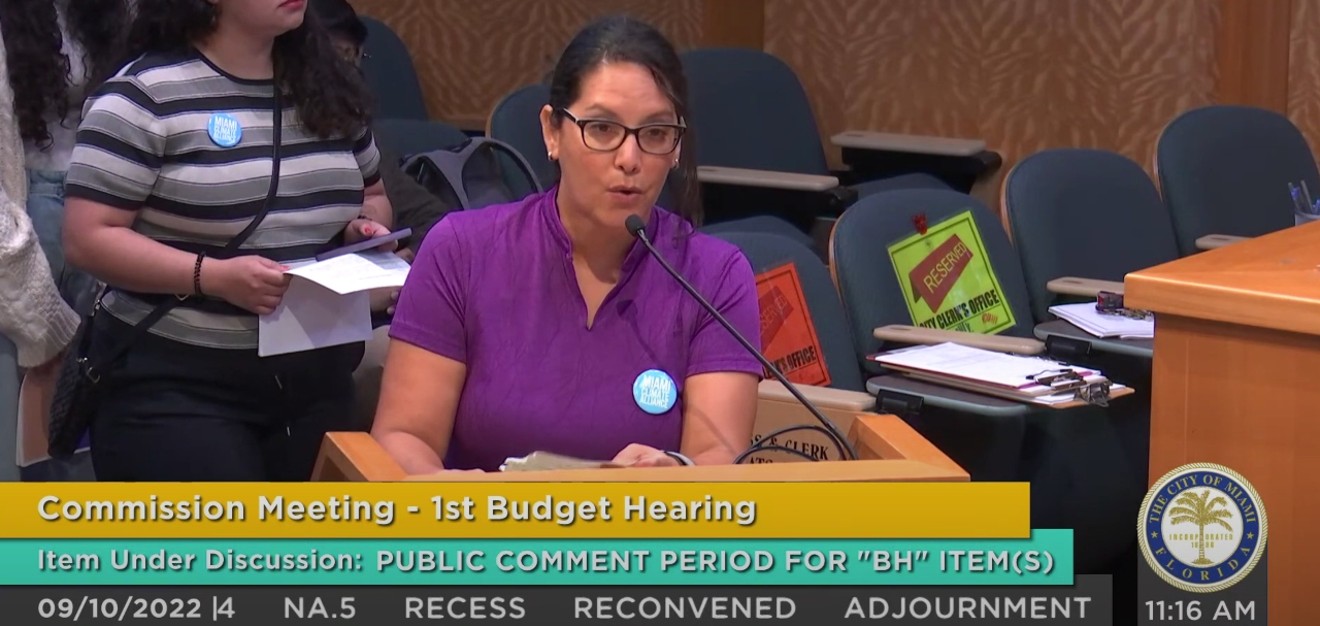With a municipality as large and influential as the City of Miami, decisions made within its borders have a wide-ranging impact on surrounding communities.
People from all over Miami-Dade County want to speak their mind about issues on which the Miami city commission is deliberating. But if folks don't live within the city limits, certain commissioners don't want to hear from them.
Just ask Jeanette Ruiz.
"He said that I didn't have the right to make demands ... because I live outside the city. I was a little taken aback," Ruiz says of Commissioner Joe Carollo, who rebuffed her at a City of Miami budget hearing earlier this month.
Ruiz, a program director with the nonprofit Miami Climate Alliance who lives in unincorporated Miami-Dade County, gave public comment at the budget hearing on September 10, advocating for more funding for the city's Division of Resilience and Sustainability, a department that handles budgeting and planning for climate change.
During her comments, Ruiz asked for more transparency from the commission, saying the city had not done enough to advertise its first budget hearing to the public. That assertion rankled Carollo.
"You don't live here. Your words were a little harsh, I thought, and you're not a resident." Carollo said from the dais. "All of you people that don't live in the City of Miami, I'm sorry, but you don't have the same rights to make demands of us as residents who live here, who pay taxes, who vote for us."
The commissioner's words didn't add up for Ruiz. She works in the city, has family in the city, and patronizes businesses within city limits. She tells New Times she was not swayed from speaking out again in front of the city commission, but that Carollo's comments prompted others to stay silent.
"After that situation, one girl with our group decided not to give a comment because she was uncomfortable," Ruiz says. "There's no invisible wall between the city and outside communities. I felt I had a right to go on behalf of the Miami Climate Alliance."
This isn't the first time the issue of residency has come up with Carollo, who has carried the sentiment on the dais that only those with a city of Miami address are worth his time to listen to. That stance is also trumpeted by fellow commissioner Alex Diaz de la Portilla, who has told New Times that he will only talk to advocates and journalists who live within the city.
"Only Miamians can decide Miami's future," Diaz de la Portilla said in a text message to New Times, declining to speak on the phone unless a reporter gave an address within the city.
Leaders of a major municipality not paying attention to those who live around that municipality is bad policy, according to open government experts with the Florida Center for Government Accountability (FLCGA).
"It's bullshit," says Barbara Petersen, executive director of FLCGA.
Petersen explains that Florida open meeting law requires that boards and commissions take public comment on an issue subject to legislative action and that they can't discriminate on who can give public comment.
While the City of Miami does not appear to be violating that law, Petersen suggests that commissioners who don't want to hear from nearby residents are going against the spirit of open government and that their stance makes no sense for a city that has a major impact on the surrounding area.
"It's very narrow and very shortsighted to limit comments you listen to to only people who live in the city," Petersen tells New Times. "Why run for public office if you don't want to talk to the public?"
Other elected officials on the city commission disagree with their colleagues on the importance of taking outside residents' voices into consideration. For her part, Commission Chairwoman Christine King has been a proponent of allowing folks who live outside the city limits to speak their minds at Miami government meetings.
"Anyone who feels strongly enough about an item and makes the great effort to attend our commission meetings should have the opportunity to be heard," King tells New Times.
Because Miami has such an outsize effect on the rest of South Florida, Commissioner Ken Russell says it's only right to hear from people from outside the city on certain issues.
"I appreciate that the city of Miami is large enough that the things we do with housing and the environment will have a regional impact. I'm happy to hear from people outside my district or city how our decisions will affect them or the world as a whole," he says.
Russell concedes, however, that while the law requires the commission to allow people to speak, it does not require commissioners to listen.
"Each commissioner has their own internal measurement of who they answer to, whether it's good governance, the greater good, or only their constituents in their districts," Russell says.
Commissioner Manolo Reyes says that anyone should be able to speak at public meetings and be heard, even if he prefers to hear from city residents.
"We live in a democracy. I don't care where you live — if you see something wrong with the city, come and talk," he tells New Times.
[
{
"name": "Air - MediumRectangle - Inline Content - Mobile Display Size",
"component": "19274298",
"insertPoint": "2",
"requiredCountToDisplay": "2"
},{
"name": "Editor Picks",
"component": "17482312",
"insertPoint": "4",
"requiredCountToDisplay": "1"
},{
"name": "Inline Links",
"component": "18711090",
"insertPoint": "8th",
"startingPoint": 8,
"requiredCountToDisplay": "7",
"maxInsertions": 25
},{
"name": "Air - MediumRectangle - Combo - Inline Content",
"component": "17482310",
"insertPoint": "8th",
"startingPoint": 8,
"requiredCountToDisplay": "7",
"maxInsertions": 25
},{
"name": "Inline Links",
"component": "18711090",
"insertPoint": "8th",
"startingPoint": 12,
"requiredCountToDisplay": "11",
"maxInsertions": 25
},{
"name": "Air - Leaderboard Tower - Combo - Inline Content",
"component": "17482313",
"insertPoint": "8th",
"startingPoint": 12,
"requiredCountToDisplay": "11",
"maxInsertions": 25
}
]












